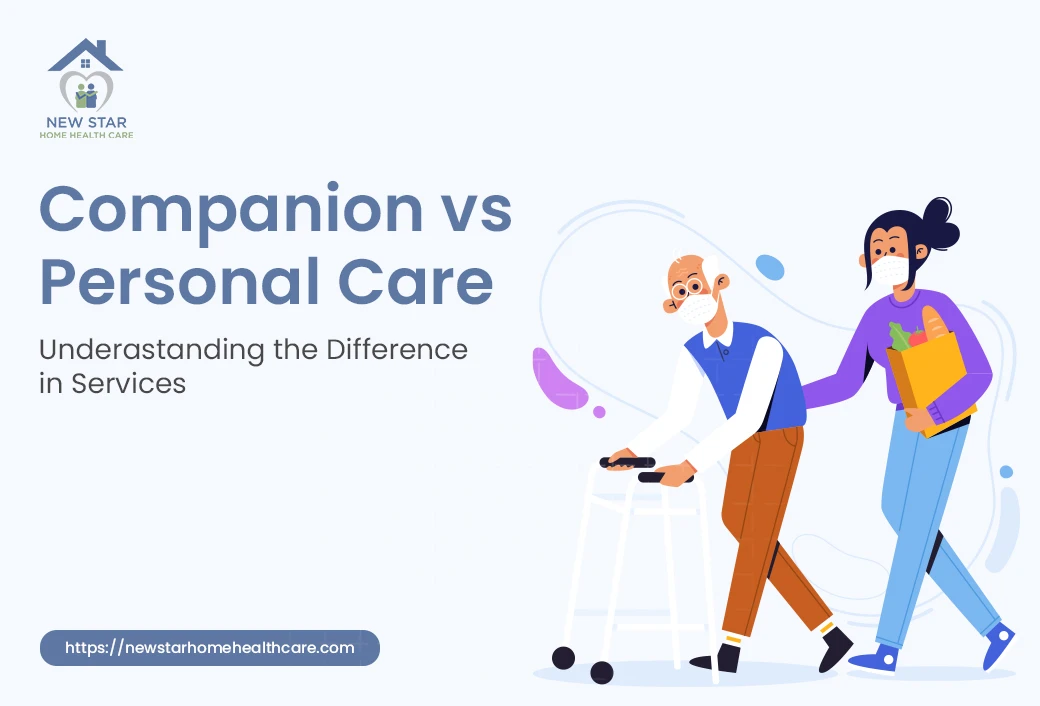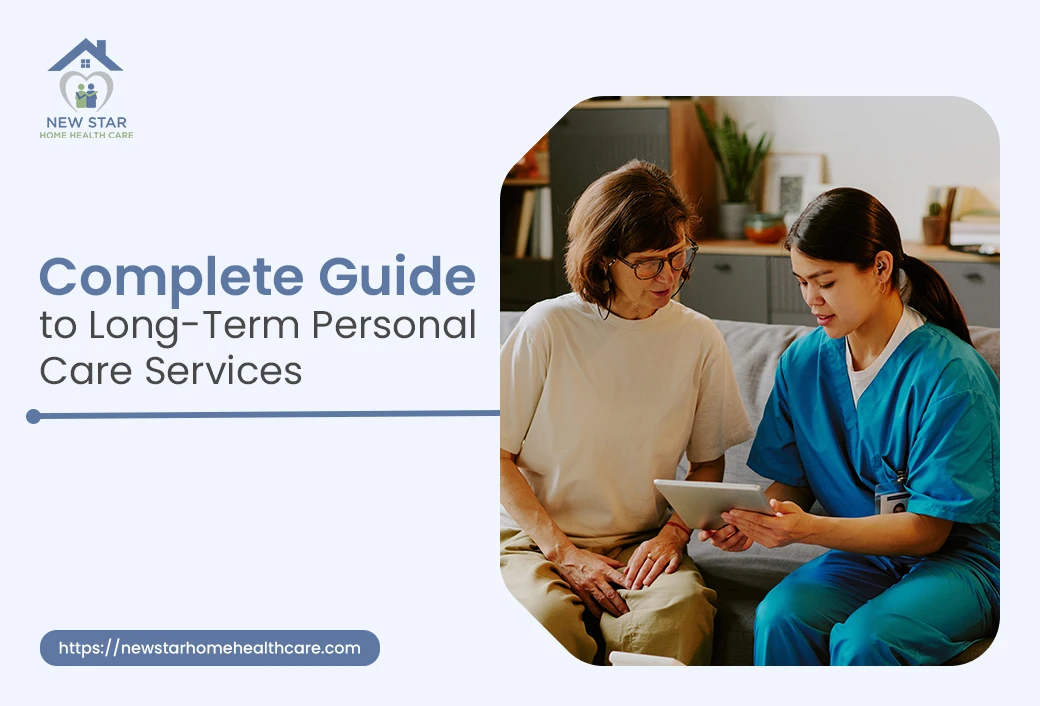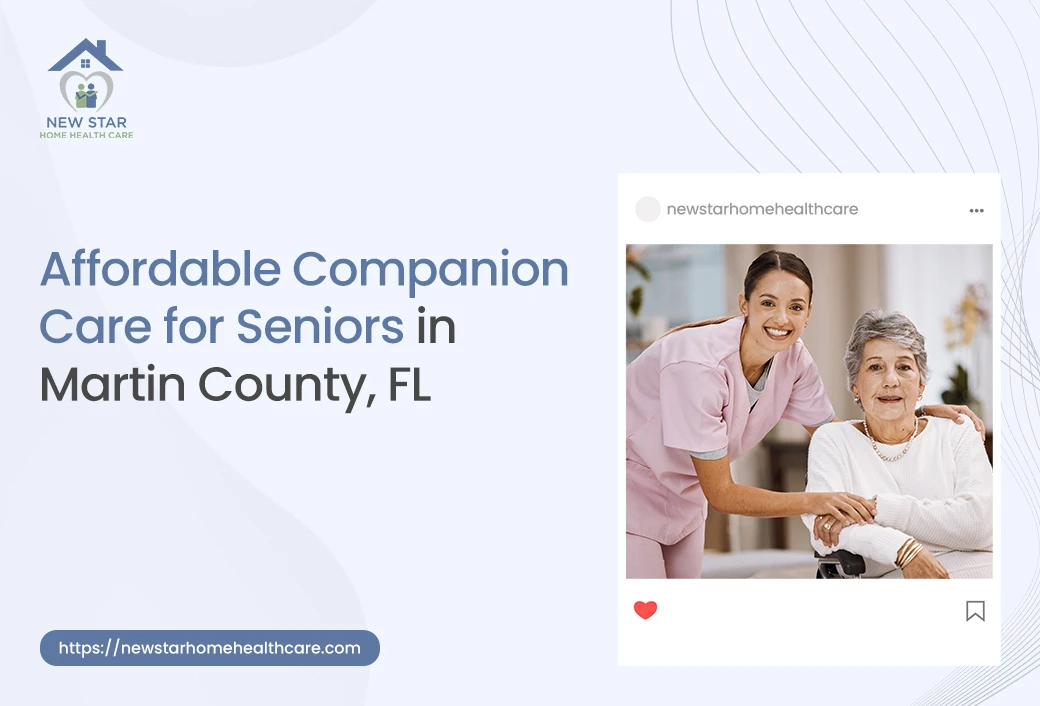What if the most important decision for your aging parent wasn’t medical, but emotional?
Your mother remembers your birthday, can fold her laundry, and hums to her favorite music. She seems fine… until you realize she hasn’t spoken to anyone in person for over a week.
Your father, on the other hand, finds it difficult to do everyday things like taking a shower or getting down through stairs, but he enjoys their daily chats and they both laugh.
In both situations, the type of support they are receiving, Companion vs Personal Care assistance, decides if they are surviving or truly living.
Actually, the problem is that most families don’t realize there is a difference, which leads to higher stress, burnout, and sometimes even hospital visits.
So let’s clear the confusion once and for all with this guide stating real differences between companion care services and personal care services. Be ready to choose what truly fits your loved one.
What Is Companion Home Care?
This emotional support service is all about social interaction and basic help at home. It would not be incorrect to view a senior companion carer as a kind friend or helpful assistant, as they are perfect for elderly people or those who are largely self-sufficient. What they mostly require is just companionship and light support with everyday tasks.
Despite not offering medical or direct physical care, they can significantly enhance a person’s mental and emotional health.
Wanna know what all Companion Care Services could be at your door? Read below:
- Friendly conversation and emotional support
- Reading books or watching TV together
- Going for walks or outings
- Playing games and hobbies
- Light housekeeping
- Meal preparation
- Grocery shopping and errands
- Medication reminders
- Transportation to appointments or events
Senior Companion Care has the utmost power to delay the need for more intensive care while keeping older adults engaged and satisfied doing what they enjoy most.
But not every aging parent just needs a friend because they may need real, hands-on help to move through the day comfortably, which only the other side of the Companion vs Personal Care equation becomes essential.
What is Personal Care Assistance?
Senior personal care is simply support for older adults with Activities of Daily Living (ADLs). Yes, things like dressing, bathing, walking around safely, or even remembering their medicines come here.
This help is mostly provided by trained personal caregivers to people who can’t fully take care of themselves. On our home health care services platform, we get calls daily from people recovering from surgery, living with a chronic illness, or experiencing mobility issues due to age or disability to hire our carers.
Well, talking about what personal care services you can expect are:
- Bathing and shower assistance
- Dressing and grooming
- Toilet and incontinence care
- Eating and dietary assistance
- Help with walking and transfers
- Non-clinical medication
- Help with physical therapy exercises
- Basic health monitoring (like checking vitals)
When you see all the signs of struggle in your old-age parent at that time, choosing the right care ensures their safety, dignity, and health.
At this point, you might be thinking of the conclusion coming up next, telling you which one is better for your loved one. So to make things super clear, here is a simple side-by-side comparison of Companion vs Personal Care.
Key Differences Between Companion and Senior Personal Care
Now that we have covered the details in paragraphs, we would like to help you with a good comparison table for our quick decision-makers. Let’s look at the Companion vs Personal Care:
| Aspect | Companion Care | Personal Care |
| Focus | Social and household help | Physical and health-related aid |
| Skill | No training required | Certified or trained caregiver |
| Suitability | Independent, social support needed | Needs daily physical assistance |
| Activities | Chat, errands, light chores | Bathing, grooming, toileting, feeding |
| Best For | Lonely but mobile seniors | Seniors with mobility issues |
| Goal | Emotional well-being, connection | Hygiene, safety, dignity |
| Medical Role | Observes, reports health changes | Assists with health routines |
| Schedule | Part-time or weekly visits | Daily or live-in support |
| Cost | Lower, non-medical service | Higher due to physical care |
The choice between these two depends largely on the level of independence the individual has. But what we suggest who come to us first start with companion home care, and if more support is needed, you can upgrade to personal care easily. Being in care services, we know that few home care agencies allow flexible transitions just like we do.
Final Words:
As we come to the end of our Companion vs Personal Care assistance blog, let’s clear up a few important things before you move on with your day. Care decisions aren’t about choosing between “right” and “wrong.” They’re about choosing what truly fits your loved one’s life right now.
And we already have discussed that for independent but isolated elders, companion care is something that gives someone to talk to and something to look forward to.
If they are struggling with daily tasks, senior personal care gives them safety, support, and dignity.
Most people wait until things get urgent, but you don’t have to. And when it comes to trusted companionship and personal care in Florida, we would be doing you a disservice if we didn’t mention ourselves.
With a Yelp rating of 4.9, fully certified carers, and skilled nurses, New Star Home Health Care is pleased to offer families services that are always heartfelt, professional, and personable.
Making the best decision is made simpler when you know the difference between companion and personal care, especially when you have a staff that genuinely cares about your loved one’s requirements.
So don’t wait for things to get overwhelming.
Start simple, start early, and most importantly, start with what they actually need.
Frequently Asked Questions:
1. Can I Get Both Companion And Personal Care for My Parent?
Yes, blended is what many families opt for. Your loved one may need a companion for the day and personal care support in the morning or evening. We understand this requirement and deliver the solution for it.
2. What Signs Should I Watch for If I’m Unsure Which Care Is Right?
Observe things such as forgetfulness, poor personal hygiene, missed meals, or abrupt retreat into social isolation. Emotional loneliness refers to companion care; physical struggle indicates personal care.
3. Will My Parent Lose Their Independence If I Begin Care Too Soon?
In fact, proper care ensures longer independence. Companion or personal care can stop decline, enhance confidence, and retain mastery of their own life.
4. Can One Test Out One Type of Care Before Going Long-Term?
Absolutely. Trial periods or short-term contracts are the perfect way to get a feel for what works. With New Star, you can dip your toes in the water without the long-term contracts or stress.
5. How Do Family Caregivers Feel About Receiving Care Services?
Most family members feel guilty initially, but when care starts, they usually feel relief, less burnout, and are able to spend more quality time with their loved one, not merely caretaking.



